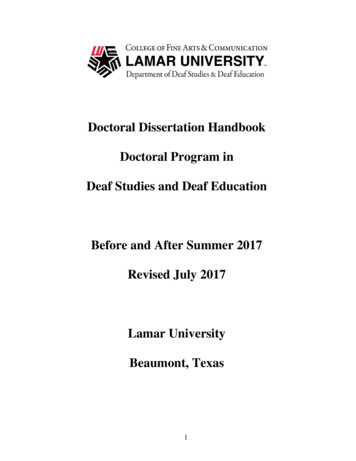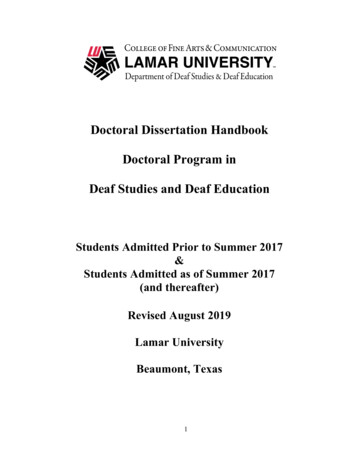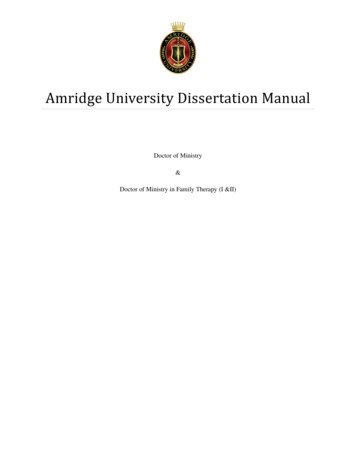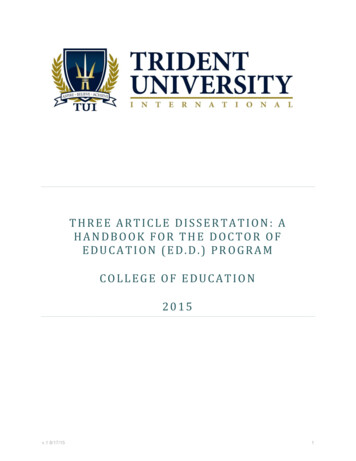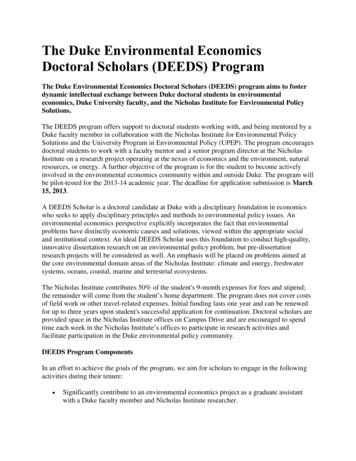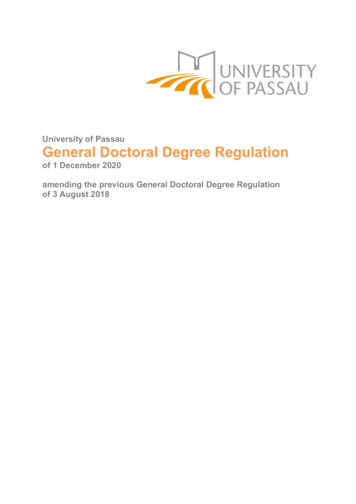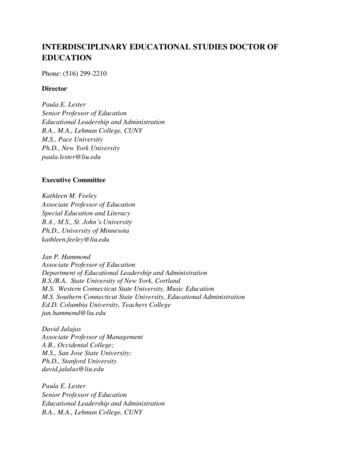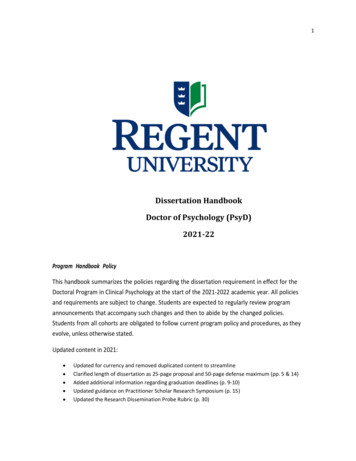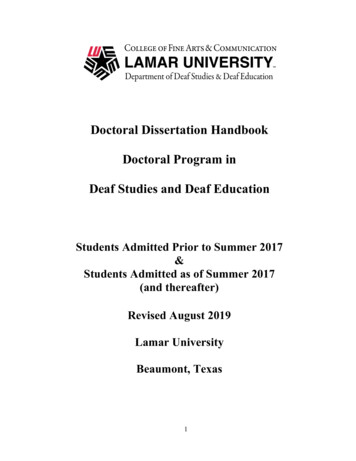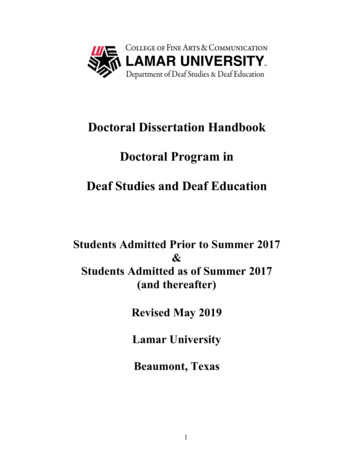
Transcription
Doctoral Dissertation HandbookDoctoral Program inDeaf Studies and Deaf EducationStudents Admitted Prior to Summer 2017&Students Admitted as of Summer 2017(and thereafter)Revised May 2019Lamar UniversityBeaumont, Texas1
Table of ContentsIntroduction .5Progress Through the Doctoral Program .5Program Learning Outcomes.5Acceptance.6Doctoral Academic Advisor.6Duties of Doctoral Academic Advisor. 6Preliminary Examinations .6Dissertation Committee .7Chair Duties. . 7Choosing the Dissertation Committee Chair . 8Comprehensive Examinations .9Developing a Portfolio . 9Doctoral Candidate . 10Dissertation Proposal Defense. 10Components of the Research Proposal and Dissertation . 11Parts of a Formal Research Proposal and Dissertation Research . 11Proposal/Dissertation . 12Title. . 12Abstract. . 12Table of Contents. . 12Signature page . 12Copyright. 12Acknowledgments . 13List of tables and illustrations . 13Chapter I. Introduction, or Statement of the Problem . 132
Chapter II. Review of the Literature and Research Questions. 13Chapter III. Methodology. . 13Chapter IV. Results. . 14Chapter V. Discussion. . 14References. 14Appendices. 14Moving Towards Dissertation Defense . 14Preliminary Submission to Graduate Editor . 14Preparation to Defend . 15Preparation to Graduate . 15Final Oral Dissertation Defense. 16After the Defense. 16Final Submission Process . 171.Signature Page . 172.Thesis Book Invoice for Binding . 173.Proof of Payment of Book Invoice . 174.Personal copies are ordered separately . 175.Proof of Submission to UMI/ProQuest. 17How to Submit Your Electronic Thesis or Dissertation (ETD) Online. 18Forms . 20D-0Preliminary Program Plan . 21Listing of Ed. D. Deaf Studies and Deaf Education Courses – Students Admitted Prior toSummer 2017 . 22Deaf Studies and Deaf Education Course Sequence – Students Admitted Prior to Summer2017 . 23Listing of Ed. D. Deaf Studies and Deaf Education Courses – Students Admitted as ofSummer 2017 (and thereafter) . 24Deaf Studies and Deaf Education Course Sequence – Students Admitted as of Summer 2017(and thereafter). 25Preliminary Program Plan: DSDE Doctoral (Ed. D.) – Students Admitted as of Summer 2017(and thereafter). 26D-1Preliminary Examination Committee . 28Preliminary Examination Rubric . 29D-2Results of the Preliminary Examination . 303
D-3ACourse of Study . 31D-3BComposition of Doctoral Committee . 33Comprehensive Examination Rubric 1: Assessment for the Doctoral ComprehensiveCandidacy Portfolio Review . 34Comprehensive Examination Rubric 2: Rubric for Evaluating Doctoral ComprehensiveCandidacy Chapter 1 of the Dissertation . 35D-7Results of Comprehensive Written and/or Oral Examination. 38D-4Approval of Dissertation Proposal . 40Approval Form for Editing Dissertation . 41D-5ASchedule for Doctoral Dissertation Oral Defense . 42D-5BResults of the Dissertation Defense . 43D-6Transfer Credit. 44D-15A Request to Change Graduate Student’s Committee. 454
IntroductionThe doctoral dissertation handbook, graduate catalog, and official university website provideinformation concerning policies and procedures for students in the Deaf Studies and DeafEducation doctoral program. The student is responsible for reading all literature on the DeafStudies and Deaf Education program, College of Graduate Studies, College of Fine Arts andCommunications, and Lamar University policies and procedures.The Deaf Studies and Deaf Education program was approved by the Texas Higher EducationCoordinating Board as a 66-hour Doctor of Education (Ed. D.) degree program in 1993. The 66hour program consists of 36 hours of core courses, 12 hours of cognate courses, 12 hours ofstatistic/research courses, and 6 hours of dissertation credits.Lamar University is one of only a few universities in the United States offering a doctoral degree inDeaf Studies and Deaf Education. In offering this program, Lamar University is addressing acritical national and international shortage of doctoral-trained educators of the deaf. Graduates ofthe doctoral program go on to assume leadership roles in schools for the deaf or become teachertrainers in university settings.General admissions requirements can be found in the graduate catalog and on the universitywebsite. After the student has been accepted by the College of Graduate Studies, and theDepartment of Deaf Studies and Deaf Education, the student meets with the Director of the DeafEducation division (or a designated representative). The Director will assist the student and advisethem for first semester courses and address the issue of who will be the student’s faculty AcademicAdvisor. The Director of Deaf Education will also provide an overview of the program and answerany questions the student has at that time. Furthermore, the Director will continue to assist thestudent until an Academic Advisor is assigned. Assistance may include, but is not limited to,course selection, research topics, procedural and policy requirements, and doctoral programrequirements and deadlines. A student’s Academic Advisor must be a member of the Deaf Studiesand Deaf Education Department faculty, must hold graduate faculty status at Lamar University, andwill be chosen during the student’s first year of residence. Once assigned, the Academic Advisorassists the student in deciding what courses are to be taken, what research topics should beinvestigated, and in some cases, what types of financial support are available to the student.Progress Through the Doctoral ProgramProgress through the doctoral program is marked by several milestones; acceptance, preliminaryexamination, comprehensive examination, candidacy, dissertation stage, and graduation. Studentsare expected to accomplish Program Learning Outcomes throughout all stages of their doctoralstudies.Program Learning OutcomesDoctoral students’ progress through the doctoral program will include accomplishing four ProgramLearning Outcomes. They include:1. Apply the basic principles of inquiry and research design to educational research5
2. Demonstrate “T” learning; the top of the T demonstrates breadth in knowledge about DeafStudies and Deaf Education while the stem of the T demonstrates depth of knowledge in thecognate/dissertation area3. Demonstrate an ability of ASL/English bilingual fluency in academic content4. Publish peer-reviewed and translational articlesAcceptanceOnce a doctoral student formally enters the program, the Director of the Department of DeafStudies and Deaf Education Ed.D. program registers them for classes and assigns a facultyAcademic Advisor within the first year of residence. The Director serves as the Academic Advisoruntil one is assigned.Transfer CreditsTransfer credits must be submitted to the Director of the Deaf Education and Deaf StudiesDepartment and approved within the student’s first semester of study in the doctoral program. Acopy of the transcript with course descriptions (if requested) must be submitted with “Form D-6:Transfer Credit” to Graduate Studies office.Doctoral Academic AdvisorDuties of Doctoral Academic Advisor. As stated above, the Director of the Deaf Studiesand Deaf Education Ed.D. program assigns the doctoral student a Doctoral Academic Advisor. TheAcademic Advisor will assist the doctoral student until the student has passed the preliminaryexamination. The Academic Advisor may later be chosen as the Dissertation Committee Chair, butit is not a requirement. The Dissertation Committee Chair and the student will work closelythroughout the dissertation stage, especially when doing research and writing the dissertation.Choosing their Dissertation Chair is one of the most important decisions that a doctoral student willmake. Besides the research and dissertation work, the Dissertation Committee Chair may beinstrumental in assisting a doctoral student with post-graduation opportunities.Program PlanA program plan should be developed in consultation with your Academic Advisor within your firsttwo semesters of study. The plan will guide your coursework throughout the remainder of theprogram, and assist in keeping you on track with all program requirements and expected ProgramLearning Outcomes. You are responsible to make any changes to your coursework, specify thecognate courses (course number, course title, credits), and insert your grades on the program plan foryour records. This information is also needed to complete “Form D-3A: Course of Study.”Preliminary ExaminationsThe preliminary examinations are designed to assess the student’s capacity for critical analysis andsynthesized integration of knowledge acquired during the course of study for the doctoral degree inDeaf Studies and Deaf Education. Satisfactory performance in coursework does not necessarilyguarantee successful performance on the preliminary examination. A student must take theexamination after completion of 18 credits of doctoral-level course work within the program.Two forms, “Form D-0: Preliminary Program Plan” (approval of the degree plan) and “FormD-3A: Course of Study,” from the Doctoral Program Director are required prior to establishing the6
dates for the exam. The Doctoral Program Director will create the Preliminary ExaminationCommittee and complete “Form D-1: Preliminary Examination Committee”.The preliminary examinations typically occur after the second semester of program studies or whenstudents have completed a minimum of 18 credits of doctoral-level course work. Students mustwork with the Doctoral Program Director during their first semester to develop a Reading List of atleast 15 papers in an area of interest. At the end of the second semester or 18 hours, the DoctoralProgram Director will convene the committee to develop questions for each student based on theirReading List and given a question by the Doctoral Program Director and will have two weeks tocomplete the written paper. The paper can be no more than 15 pages, which does not include thecover page and references (fewer pages may not be enough to effectively answer the question). Itmust follow APA guidelines (typed with 12-point Times New Roman font and 1-inch margins allaround). Students may not collaborate or consult with others while taking their preliminaryexamination.If a student fails the preliminary examination, they may be recommended for expulsion or thePreliminary Examination Committee may decide to grant an opportunity to retake the examination.Note, the examination may only be retaken one time. If granted a retake, it must be completedwithin one month of the original exam. Once the student successfully completes the preliminaryexamination the Preliminary Examination Committee completes “Form D-2: Results of thePreliminary Examination.”Reasonable accommodations will be made to allow students with disabilities to take the preliminaryexamination. The student should discuss individual needs with the Chair of the Doctoral AdvisoryCommittee to arrange accommodations as needed.Dissertation CommitteeWhile it may feel a bit early in the process to begin thinking about dissertation committees, it is anecessary step before beginning comprehensive examinations. Prior to beginning thecomprehensive examination process, you should have already determined your DissertationCommittee Chair and worked with them to develop your committee. Your Dissertation Committeewill be responsible for your Comprehensive Examination process, hence why the selection processtakes place before then.Chair Duties. The Dissertation Committee Chair is the doctoral candidate’s primaryadvisor during all phases of the dissertation process. The Dissertation Committee Chair is theleader of the Dissertation Committee and its liaison with the student, the program, the Departmentof Deaf Studies and Deaf Education, and the Graduate School (Please note that the DissertationCommittee Chair may or may not be the same individual as the candidate’s Doctoral Chair orAcademic Advisor). The Dissertation Committee Chair convenes and conducts the proposal anddissertation defense meetings. In conjunction with other Dissertation Committee members, theDissertation Committee Chair is responsible for providing technical and content advice andassistance. A faculty member, who has served on at least three Dissertation Committees at anyaccredited college or university, is eligible to chair a Dissertation Committee. Exceptions may begranted by the Dean of Graduate Studies if officially requested and justified by the Chair of theDepartment of Deaf Studies and Deaf Education. However, otherwise qualified individuals outside7
the Department of Deaf Studies and Deaf Education may serve in a Dissertation Committee CoChair capacity if the Chair of the Department of Deaf Studies and Deaf Education approves such anarrangement. Dissertation Committee Chairs who terminate employment with Lamar Universitymay continue committee service for a 12-month period following the termination. After that time,the individual may no longer serve as a Doctoral Dissertation Committee Chair, but may serve as aDissertation Committee Co-Chair (with the Department of Deaf Studies and Deaf EducationChair’s approval) or simply as a member of the committee.Choosing the Dissertation Committee Chair. Choosing the Dissertation Committee Chairis a two-way process. The student may choose a Professor (i.e., faculty member) as a DissertationCommittee Chair, but the Professor must also agree to assume responsibility for the student.Doctoral students are encouraged to get to know faculty members, seek copies of faculty members’curriculum vita, review faculty members’ research and publication record, and begin to establish arelationship with their professors. Students may choose a Professor with whom they have mutualresearch interests and with whom they feel comfortable communicating and interacting. Studentscan begin to get to know faculty members by taking courses with them or through scheduledappointments to discuss mutual research interests.A chosen faculty member may decline a request to be a Dissertation Committee Chair. There aremany reasons a faculty member may decide not to work with a student. The faculty member maybe advising too many students to provide quality time with them. The faculty member may alsofeel that they would not work well with the student. In the selection of the Dissertation CommitteeChair, both the student and faculty member must realize that each party should choose each other.Students may decide to choose a faculty member to be their Dissertation Committee Chair for avariety of reasons such as the faculty member’s reputation for quality teaching, scholarship,research productivity, publications, student advocacy, and interpersonal style.Once the Dissertation Committee Chair is selected, Form D-3B is developed. The DissertationCommittee Chair will assist the student in selecting other members of the Dissertation Committeethat is typically done during the semester before taking Proposal Writing, finalize the courses ofstudy (if needed), and completing the dissertation.Working together, the student and Dissertation Committee Chair will decide on the DissertationCommittee. A Dissertation Committee consists of a minimum of five graduate faculty members,including a minimum of three Lamar University Deaf Studies and Deaf Education faculty members,and two other graduate faculty members. Two other graduate faculty members must either bemembers of the Lamar University graduate faculty or come from outside the university. Theyshould be chosen for their expertise in research design or content area. As is the case with choosingthe Dissertation Committee Chair, all members must agree to be on the committee.The Dissertation Committee becomes official with the submission of “Form D-3B: Compositionof Doctoral Committee Form” to the Graduate Studies office. As the Chair of Department ofDeaf Studies and Deaf Education and the Dean of the Graduate School must also sign this form,these two people, in effect, approve the Dissertation Committee.The Dissertation Committee: approves the components of the comprehensive examinations; has the final decision regarding pass/fail of the comprehensive examinations;8
approves the dissertation proposal;works with the student and Dissertation Chair in advising, encouraging, and approving thedissertation research;attends the proposal presentation;approves the scheduling of the final oral examination;has the final decision regarding pass/fail of the oral dissertation defense; andhas the final decision regarding the acceptance of the dissertationComprehensive ExaminationsThe Comprehensive Examination will take place once the student has completed all courses in theirprogram plan that includes a completed proposal (chapter 1, 2, 3) from Proposal Writing. TheDissertation Committee will be responsible for implementing and evaluating the ComprehensiveExamination process.The Deaf Studies and Deaf Education doctoral comprehensive examination format will utilize aportfolio approach that requires students to document and demonstrate their knowledge and skills inDeaf Studies and Deaf Education, research, teaching, and leadership that have been attained fromcoursework and their academic experiences during the course of their doctoral studies. Portfolioswill be evaluated to determine if students have the ability to evaluate, synthesize, and apply theknowledge obtained in their studies. Therefore, students will provide evidence of accomplishingProgram Learning Outcomes. Additionally, Chapter 1 of the dissertation proposal will besubmitted to determine if the student has the ability to conduct independent research prior tobeginning the dissertation process.Developing a Portfolio. In order to pass the comprehensive examination, students mustprovide the required evidence demonstrating that they have developed the skills to do independentresearch. The portfolio must include:1.2.3.4.Professional goal statement;Curriculum vitae;Official program of study;Evidence of scholarly productivity through course work (e.g., literature review, synthesis paper,peer-reviewed publication, translational piece);5. Reflections on the impact of their coursework and time in the program on their professionaldevelopment; and6. Evidence of research abilities: Include Chapter 1 of their dissertation proposal to demonstratethat they have the skills needed to complete the dissertation.7. At least one peer-reviewed publication completed during their time in the program.Review of Portfolio Documents:The Comprehensive Examination Committee will evaluate the portfolio documents and Chapter 1of the dissertation proposal by using two rubrics. The “Assessment for the DoctoralComprehensive Candidacy Portfolio Review” and “Rubric for Evaluating DoctoralComprehensive Candidacy Chapter 1 of the Dissertation Proposal” will be completed by eachmember of the committee, and collated by the Dissertation Committee Chair. If the rubricsdetermine that the candidate has achieved a “pass”, the student will move forward with their9
Dissertation. The committee will complete “Form D-7: Results of Comprehensive Writtenand/or Oral Examinations.”If a student fails, the student will be given a one-time second opportunity to re-submit the portfolio,to be completed within one month of the first attempt. If the student fails during the secondattempt, the student will be terminated from the doctoral program.Doctoral CandidateA doctoral candidate is a student, in good standing, enrolled in a doctoral program, who hassuccessfully completed the required classes and examinations according to their approved programof study. Thus, the program has deemed the student to be ready to begin a dissertation study. Thedissertation is the last requirement for the doctoral degree. Students in this stage are also referred tobeing “All But Dissertation” or ABD to reflect the fact they have completed all programrequirements except the dissertation itself.Doctoral candidates, in consultation with their Academic Advisors, take responsibility to seek thecooperation of appropriate and qualified individuals to serve on their dissertation committee.Candidates are also expected to initiate dialogue with committee members, follow recommendedtimetables, and plan committee meetings in accordance with the recommendations of the committeechair. In the development of working relationships with committee members, the candidate shouldbe mindful that members have many other professional responsibilities.The successful completion of a dissertation is emphasized as only one of the doctoral programrequirements; however, it is a crucial and necessary step for earning a doctoral degree. It is thestudent’s responsibility to understand and satisfy all of the requirements of their individualapproved program plan and any college or university degree and/or graduation requirements.Doctoral candidates must maintain matriculation at the university until completion of their degree.Even when a student has completed all other requirements of the program with the exception of thedissertation, they must continue to register each semester until completion of the dissertation.Dissertation Proposal DefenseThe Dissertation Committee Chair, after giving approval that the dissertation proposal is ready to bedefended, submits the proposal to all members of the Dissertation Committee. The DissertationCommittee has two weeks to review and provide feedback to the candidate. After receivingfeedback, the candidate should make the requested changes and again obtain the agreement of theDissertation Committee Chair that the proposal is ready to defend. The candidate will then contactall Dissertation Committee members and schedule the dissertation proposal defense. The candidateshould work with the Deaf Studies and Deaf Education Administrative Assistant to schedule a roomfor the defense, as well as any required accommodations such as interpreters.If the proposal is found to be acceptable during a defense, “Form D-4: Approval of DissertationProposal” is signed by all Dissertation Committee members. The Dissertation Committee Chairshould retain this form while the proposal is then submitted by the candidate to the InstitutionalReview Board (IRB) for review. Both Dissertation Committee approval and IRB approval arerequired before work can proceed. A copy of the approved proposal and the approved IRB form10
must be attached to the original copy (with original signatures) of Form D-4, which the DoctoralProgram Director then submits to the Graduate Dean’s office for review and filing. A copy of theapproved dissertation proposal and a photocopy of the IRB’s approval should be given to theDoctoral Program Director for the candidate’s file in the office of the Department of Deaf Studiesand Deaf Education.The dissertation must be a minimum of 6 credit hours. Students will not be awarded a master’sde
In offering this program, Lamar University is addressing a critical national and international shortage of doctoral-trained educators of the deaf. Graduates of the doctoral program go on to assume leadership roles in schools for the deaf or become teacher trainers in university settings.
